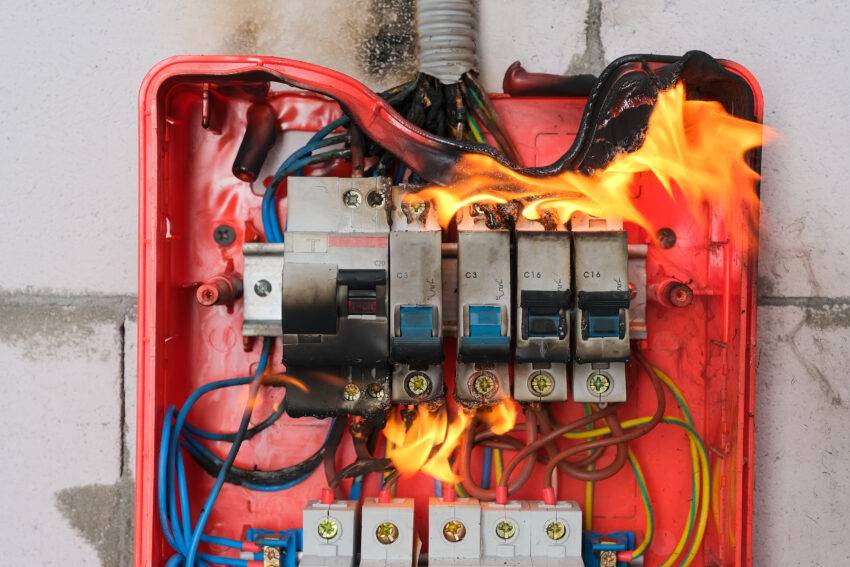Electrical fires are a major safety concern for high-rise buildings. Faulty electrical wiring and overloaded circuits can quickly become an inferno, risking many lives.
As a building owner, manager, or employee, you must understand the hazards and take steps to minimize the chance of an electrical fire breaking out. Follow these seven must-follow rules to help prevent electrical fires in your high-rise building.
Regularly Inspect Electrical Systems
One of the best ways to avoid electrical fires is through proactive maintenance and inspection of electrical systems. Building owners and managers should have licensed electricians conduct inspections of all electrical equipment at least annually. Check for frayed wires, loose connections, damaged insulation, and overloaded circuits. Thermography inspections can identify “hot spots,” often indicating a fire hazard. Remediate any issues immediately to prevent potential disasters down the road.
Train maintenance staff to look for signs of electrical arcing, overheating, and smoke from outlets. Pay particular attention to high voltage capacitor banks, which can overheat. The cost of regular inspections is minor compared to the risk of fire-related building damage and lawsuits. Don’t let inspections fall by the wayside, or electrical hazards will creep in unnoticed. Schedule professional electrical inspections like you would regular fire alarm system testing. The small time and financial investment will pay back exponentially in safety.
Ensure Proper Load Balancing
When circuits or outlets are overloaded with too many devices and appliances plugged in, it creates excess heat that can start an electrical fire. Ensure circuits are properly balanced without any one outlet exceeding 80% capacity. Discourage the use of extension cords and multi-plug adapters which overload outlets.
Install additional circuits and outlets as needed so occupants have sufficient ports for necessary equipment without compromising safety. List the wattage of each outlet on the electrical panel along with the maximum load capacity to make load balancing easier. Proper load balancing is essential in server rooms, which generate significant heat. Don’t let makeshift wiring create an unseen overload.
Use Surge Protectors
Power surges from lightning strikes or faulty electrical work can overload circuits and spark electrical fires. Install professional-grade surge protectors on service panels to safeguard your building’s electrical system. Surge protectors will divert excess energy loads safely to the ground and prevent electrical fires in walls from power surges.
Insist occupants use surge-protecting power strips for their computers, appliances, and other sensitive electronics. This prevents fires from spreading through power outlets while also protecting valuable equipment. Replace all surge protectors according to manufacturer recommendations to ensure continued protection. Only use surge protectors within their useful life, or their protective capabilities will fail when you need them most.
Address Hazards Promptly
Pay attention to signs of electrical hazards or defer maintenance in your building. Strange odors, frequent tripped breakers, flickering lights, and buzzing from outlets or switches indicate potential dangers. Sparks, melted insulation, and blackened outlets are clear warnings. Immediately disable faulty circuits at the breaker panel until repairs can be made.
Ensure occupants report electrical concerns and field complaints quickly before the problems worsen. Poor connections are a major cause of electrical fires. Contact a licensed electrician promptly to diagnose and remedy any suspect electrical issues found. Refrain from letting problems fester since they likely indicate a severe fire risk.
Ban Portable Heaters
According to National Fire Protection Association data, portable space heaters are responsible for 32% of office fires. Their open heating elements and haphazard use around combustible materials make them very risky. Ban portable space heaters in your high-rise to remove this major fire threat.
Provide building-wide HVAC climate controls and adjust as needed to keep occupants comfortable. Post signage prohibiting unapproved space heaters and conduct periodic inspections to ensure compliance. Remove unapproved heaters found immediately before they cause catastrophe. Space heaters simply have no place in a crowded high-rise despite their popularity.
Follow Safety Codes
In addition to these tips, ensure your building’s electrical system is installed and maintained in accordance with all applicable local, state, and national fire and electrical codes. Never take shortcuts or make do with outdated wiring and equipment. Electrical safety codes exist precisely to prevent the loss of life and property through electrical fires.
Keep electrical systems correctly updated as codes change. Consult licensed electricians whenever questions arise about proper safety protocols. Refrain from letting grandfathered systems lull you into a false sense of security – they can still start dangerous fires. Bring systems up to present codes for everyone’s protection.
Train Occupants in Fire Prevention
While management is responsible for providing a safe building, occupants must also understand fire hazards and response. Provide regular fire safety training for occupants. Show them how to report smoke, burning smells or malfunctioning electrical equipment to maintenance or emergency personnel immediately.
Make your emergency action plan readily accessible so everyone knows the evacuation protocol if a fire occurs. Conduct periodic fire drills to ensure occupants can rapidly exit the building if the alarm sounds. Quick evacuation is especially crucial in tall, high-rise structures. A few minutes of confusion or delay can prove fatal. Education saves lives if an emergency strikes.
Electrical fires claim many lives annually across the nation. But being proactive about inspection, maintenance, and safety can significantly reduce their likelihood in your high-rise building. Protect lives and property through prudent fire prevention measures. The effort is minor compared to the massive costs if disaster strikes. Follow these rules to keep occupants safe and avoid devastating electrical fires in your building.


